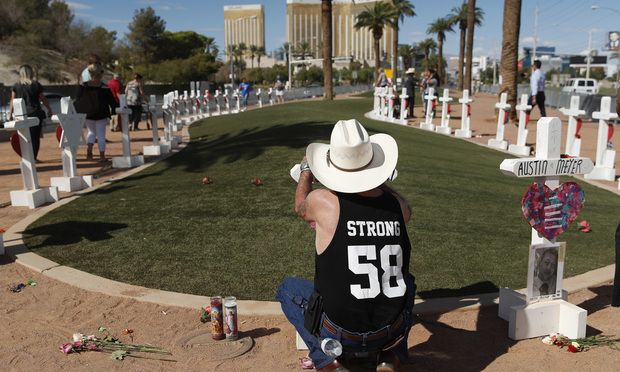Lawsuit Claims Connecticut Boss Told Vegas Mass Shooting Survivor to 'Get Over It'
A new lawsuit alleges Charles Giampaolo survived the Las Vegas mass shooting in which his father-in-law was killed, but then got no sympathy from his Connecticut employer, who allegedly told him to "suck it up."
April 02, 2019 at 04:39 PM
4 minute read
 Jim Strickland, of Oroville, California, writes a message on a cross at a makeshift memorial for victims of the Oct. 1, 2017, mass shooting in Las Vegas. Photo: John Locher/AP
Jim Strickland, of Oroville, California, writes a message on a cross at a makeshift memorial for victims of the Oct. 1, 2017, mass shooting in Las Vegas. Photo: John Locher/AP
A victim of the October 2017 shooting massacre in Las Vegas says he was forced to leave his job after management ridiculed him, told him to “suck it up” and to “get over it” after he informed them he had post-traumatic stress disorder.
In the lawsuit filed Tuesday in Torrington Superior Court, Charles Giampaolo alleges he was a top salesman at Elevator Service Co. Inc. until the company made his job unbearable, giving him no choice but to leave on April 11, 2018.
According to the lawsuit, management, including co-owner Steve Roth, accused Giampaolo, whose father-in-law died in the shooting, of being “different” and having a “bad attitude.” The company regularly and arbitrarily cut his commissions, threatened not to pay him commissions it already owed him, and admonished him to move past the shooting, the lawsuit said.
“October has come and gone, and you need to get over it,” the suit quotes Roth as saying.
The lawsuit seeks unspecified monetary damages for what it alleges occurred at the Torrington-based company that sells, services and maintains residential and commercial elevators. The lawsuit also alleges a hostile work environment and retaliation in violation of the Connecticut Fair Employment Practices Act.
Roth, who owns the company with his wife Linda, declined to comment on the lawsuit Tuesday. And his attorney, Tara Shaw of Secor Cassidy & McPartland, did not respond to a request for comment Tuesday.
Giampaolo, 36, attended the annual Route 91 Harvest Music Festival in Las Vegas on October 2017 with several family members. His father-in-law, Kurt Von Tillow, was among the 58 people killed after a gunman opened fire. Giampaolo's wife's aunt and cousin were also shot, but Giampaolo and his wife escaped injury. He was inches away from his father-in-law when the older man was killed, according to the lawsuit.
The following month, Giampaolo attended a work event with nearly 800 people and experienced a panic attack, according to the lawsuit.
There was loud music and strobe lights and “his palms sweated, his heart rate escalated, and he felt as if the walls were closing in on him,” the lawsuit said. Giampaolo told the Roths, who both were at the event, that he was diagnosed with PTSD and was a experiencing a panic attack and then ran for the door.
“After he shared his diagnosis with leadership, ESCO began a campaign to force him out of the company,” according to the lawsuit.
That alleged campaign was nonstop, according to the lawsuit and his attorneys.
“He was accused of having a bad attitude. He was told consistently that he had changed,” said Amanda DeMatteis, Giampaolo's co-counsel who works for Garrison, Levin-Epstein, Fitzgerald & Pirrotti. “Even after the horrible comment to 'get over it,' he continued to go to work everyday and performed very well.”
DeMatteis said that on April 10, 2018, the day before he parted ways with the company, Giampaolo's commission was reduced arbitrarily. “He complained to Mr. Roth about the company's conduct toward him since disclosing the PTSD diagnosis. The very next day he was demoted, stripped of his managerial bonus and the owners accused him of having a personality disorder. The day they demoted him, it was apparent they'd continue the conduct, so he separated from the company.”
The lawsuit contains an email Giampaolo sent to Steve Roth. It reads, “Your lack of empathy for me and my family has been noted. Never once have you asked how I am. How am I doing, or have just pulled me off to the side and asked if I needed to talk. Instead, you attack me where it hurts the most: my pockets.”
DeMatteis said her client has since found work in another sales position within the state. “He has had very intensive therapy since the shooting,” she said.
“It has been very up and down for Charles,” DeMatteis said. “He has been through unimaginable carnage in Las Vegas and tried to come back and find that sense of normalcy in his life, only to have it taken from him. It was traumatic in a different way, but it was still traumatic.”
Assisting DeMatteis was co-counsel Nina Pirrotti.
This content has been archived. It is available through our partners, LexisNexis® and Bloomberg Law.
To view this content, please continue to their sites.
Not a Lexis Subscriber?
Subscribe Now
Not a Bloomberg Law Subscriber?
Subscribe Now
NOT FOR REPRINT
© 2025 ALM Global, LLC, All Rights Reserved. Request academic re-use from www.copyright.com. All other uses, submit a request to [email protected]. For more information visit Asset & Logo Licensing.
You Might Like
View All
Discovery Seeks to Link Yale University to Doctor in Fertility Scandal
4 minute read
SEC Puts Beat Down on Ex-Wrestling CEO Vince McMahon for Not Reporting Settlements
3 minute read
Trending Stories
Who Got The Work
Michael G. Bongiorno, Andrew Scott Dulberg and Elizabeth E. Driscoll from Wilmer Cutler Pickering Hale and Dorr have stepped in to represent Symbotic Inc., an A.I.-enabled technology platform that focuses on increasing supply chain efficiency, and other defendants in a pending shareholder derivative lawsuit. The case, filed Oct. 2 in Massachusetts District Court by the Brown Law Firm on behalf of Stephen Austen, accuses certain officers and directors of misleading investors in regard to Symbotic's potential for margin growth by failing to disclose that the company was not equipped to timely deploy its systems or manage expenses through project delays. The case, assigned to U.S. District Judge Nathaniel M. Gorton, is 1:24-cv-12522, Austen v. Cohen et al.
Who Got The Work
Edmund Polubinski and Marie Killmond of Davis Polk & Wardwell have entered appearances for data platform software development company MongoDB and other defendants in a pending shareholder derivative lawsuit. The action, filed Oct. 7 in New York Southern District Court by the Brown Law Firm, accuses the company's directors and/or officers of falsely expressing confidence in the company’s restructuring of its sales incentive plan and downplaying the severity of decreases in its upfront commitments. The case is 1:24-cv-07594, Roy v. Ittycheria et al.
Who Got The Work
Amy O. Bruchs and Kurt F. Ellison of Michael Best & Friedrich have entered appearances for Epic Systems Corp. in a pending employment discrimination lawsuit. The suit was filed Sept. 7 in Wisconsin Western District Court by Levine Eisberner LLC and Siri & Glimstad on behalf of a project manager who claims that he was wrongfully terminated after applying for a religious exemption to the defendant's COVID-19 vaccine mandate. The case, assigned to U.S. Magistrate Judge Anita Marie Boor, is 3:24-cv-00630, Secker, Nathan v. Epic Systems Corporation.
Who Got The Work
David X. Sullivan, Thomas J. Finn and Gregory A. Hall from McCarter & English have entered appearances for Sunrun Installation Services in a pending civil rights lawsuit. The complaint was filed Sept. 4 in Connecticut District Court by attorney Robert M. Berke on behalf of former employee George Edward Steins, who was arrested and charged with employing an unregistered home improvement salesperson. The complaint alleges that had Sunrun informed the Connecticut Department of Consumer Protection that the plaintiff's employment had ended in 2017 and that he no longer held Sunrun's home improvement contractor license, he would not have been hit with charges, which were dismissed in May 2024. The case, assigned to U.S. District Judge Jeffrey A. Meyer, is 3:24-cv-01423, Steins v. Sunrun, Inc. et al.
Who Got The Work
Greenberg Traurig shareholder Joshua L. Raskin has entered an appearance for boohoo.com UK Ltd. in a pending patent infringement lawsuit. The suit, filed Sept. 3 in Texas Eastern District Court by Rozier Hardt McDonough on behalf of Alto Dynamics, asserts five patents related to an online shopping platform. The case, assigned to U.S. District Judge Rodney Gilstrap, is 2:24-cv-00719, Alto Dynamics, LLC v. boohoo.com UK Limited.
Featured Firms
Law Offices of Gary Martin Hays & Associates, P.C.
(470) 294-1674
Law Offices of Mark E. Salomone
(857) 444-6468
Smith & Hassler
(713) 739-1250











